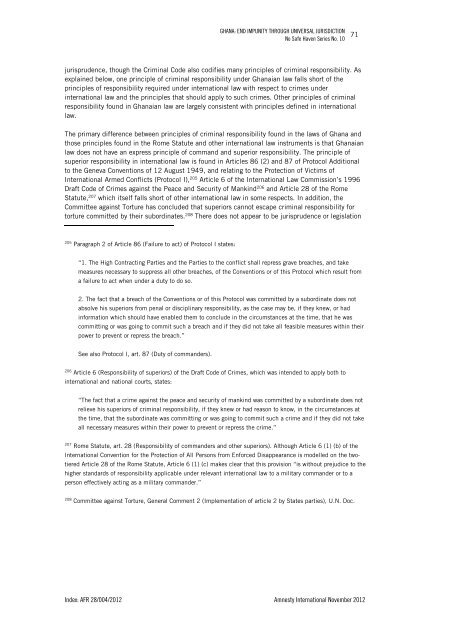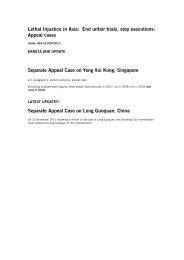Ghana - Amnesty International
Ghana - Amnesty International
Ghana - Amnesty International
You also want an ePaper? Increase the reach of your titles
YUMPU automatically turns print PDFs into web optimized ePapers that Google loves.
GHANA: END IMPUNITY THROUGH UNIVERSAL JURISDICTIONNo Safe Haven Series No. 1071jurisprudence, though the Criminal Code also codifies many principles of criminal responsibility. Asexplained below, one principle of criminal responsibility under <strong>Ghana</strong>ian law falls short of theprinciples of responsibility required under international law with respect to crimes underinternational law and the principles that should apply to such crimes. Other principles of criminalresponsibility found in <strong>Ghana</strong>ian law are largely consistent with principles defined in internationallaw.The primary difference between principles of criminal responsibility found in the laws of <strong>Ghana</strong> andthose principles found in the Rome Statute and other international law instruments is that <strong>Ghana</strong>ianlaw does not have an express principle of command and superior responsibility. The principle ofsuperior responsibility in international law is found in Articles 86 (2) and 87 of Protocol Additionalto the Geneva Conventions of 12 August 1949, and relating to the Protection of Victims of<strong>International</strong> Armed Conflicts (Protocol I), 205 Article 6 of the <strong>International</strong> Law Commission’s 1996Draft Code of Crimes against the Peace and Security of Mankind 206 and Article 28 of the RomeStatute, 207 which itself falls short of other international law in some respects. In addition, theCommittee against Torture has concluded that superiors cannot escape criminal responsibility fortorture committed by their subordinates. 208 There does not appear to be jurisprudence or legislation205Paragraph 2 of Article 86 (Failure to act) of Protocol I states:“1. The High Contracting Parties and the Parties to the conflict shall repress grave breaches, and takemeasures necessary to suppress all other breaches, of the Conventions or of this Protocol which result froma failure to act when under a duty to do so.2. The fact that a breach of the Conventions or of this Protocol was committed by a subordinate does notabsolve his superiors from penal or disciplinary responsibility, as the case may be, if they knew, or hadinformation which should have enabled them to conclude in the circumstances at the time, that he wascommitting or was going to commit such a breach and if they did not take all feasible measures within theirpower to prevent or repress the breach.”See also Protocol I, art. 87 (Duty of commanders).206Article 6 (Responsibility of superiors) of the Draft Code of Crimes, which was intended to apply both tointernational and national courts, states:“The fact that a crime against the peace and security of mankind was committed by a subordinate does notrelieve his superiors of criminal responsibility, if they knew or had reason to know, in the circumstances atthe time, that the subordinate was committing or was going to commit such a crime and if they did not takeall necessary measures within their power to prevent or repress the crime.”207Rome Statute, art. 28 (Responsibility of commanders and other superiors). Although Article 6 (1) (b) of the<strong>International</strong> Convention for the Protection of All Persons from Enforced Disappearance is modelled on the twotieredArticle 28 of the Rome Statute, Article 6 (1) (c) makes clear that this provision “is without prejudice to thehigher standards of responsibility applicable under relevant international law to a military commander or to aperson effectively acting as a military commander.”208Committee against Torture, General Comment 2 (Implementation of article 2 by States parties), U.N. Doc.Index: AFR 28/004/2012 <strong>Amnesty</strong> <strong>International</strong> November 2012
















